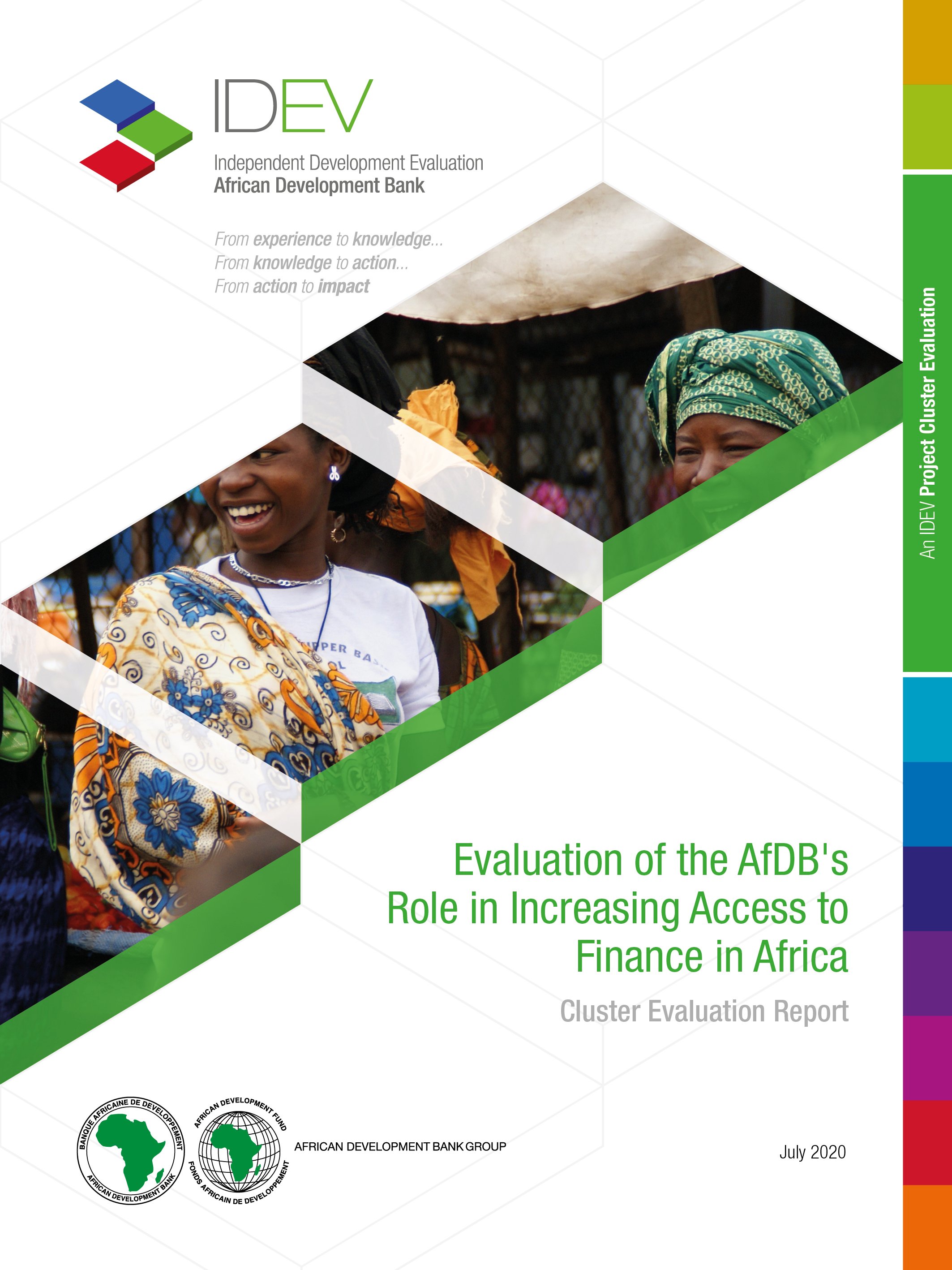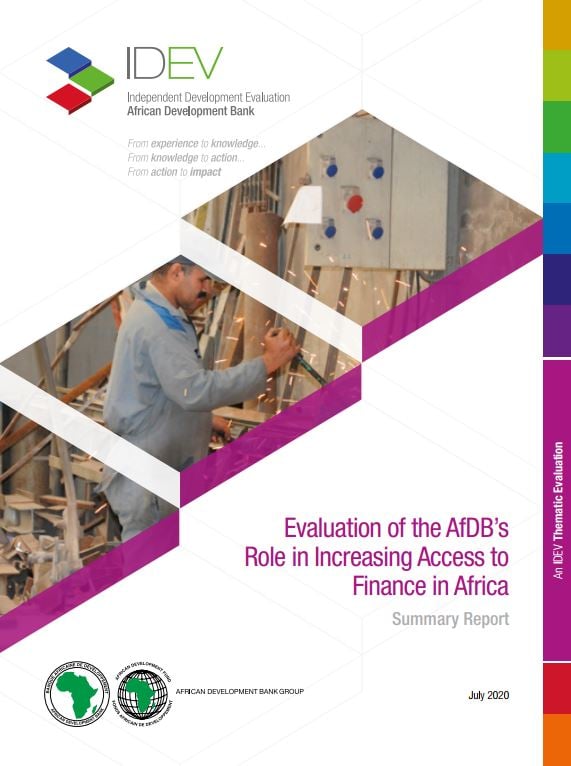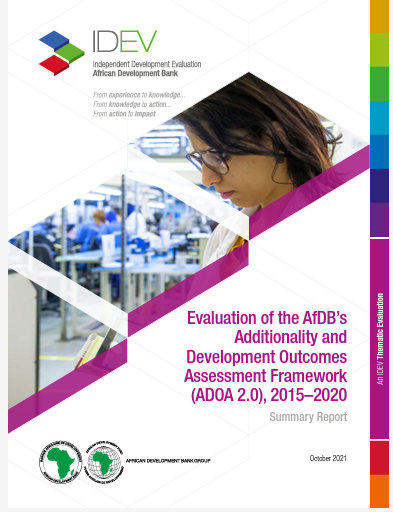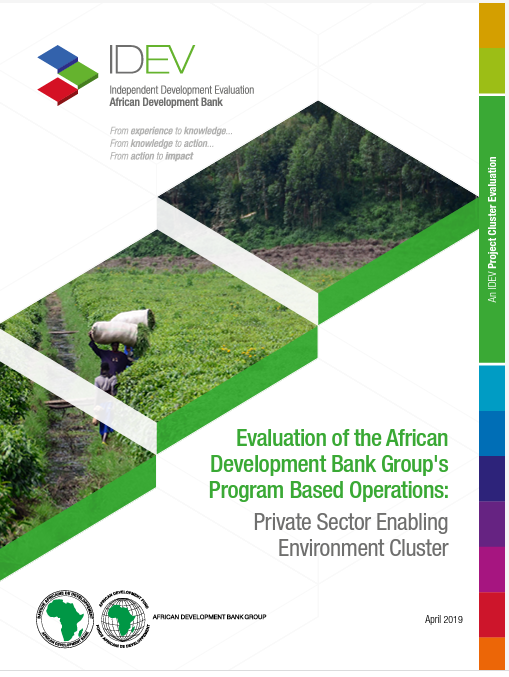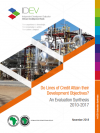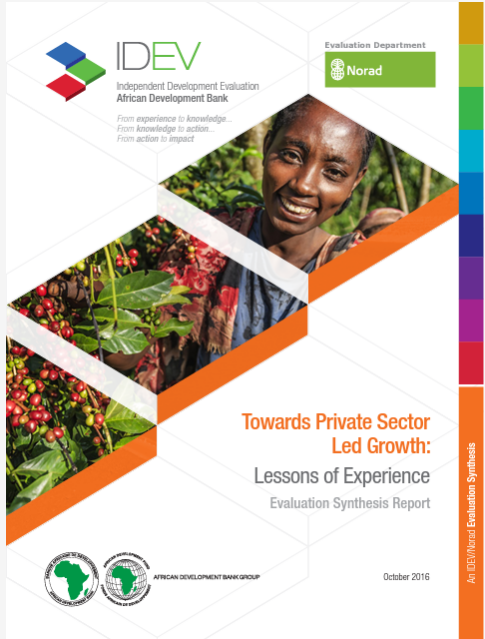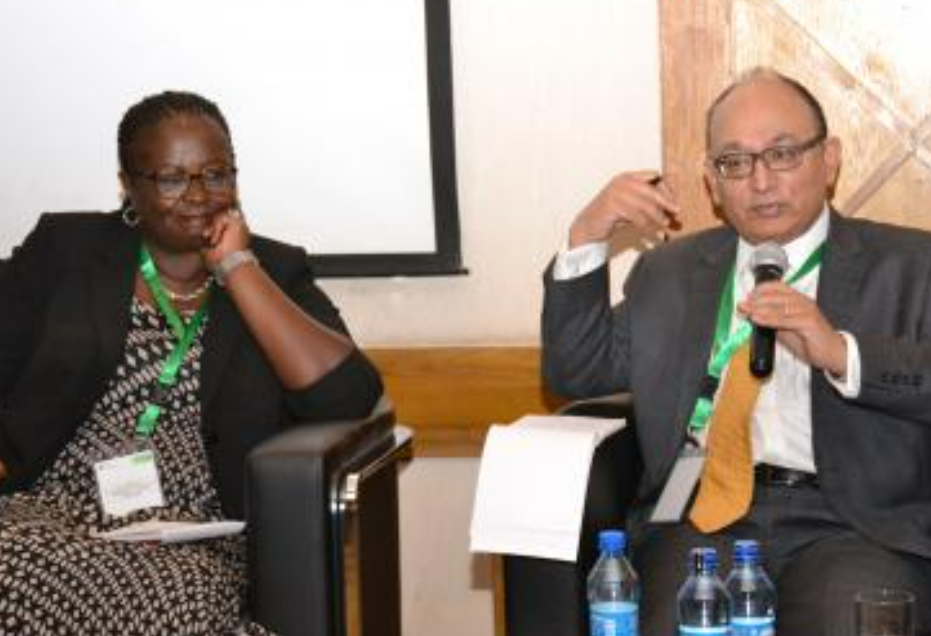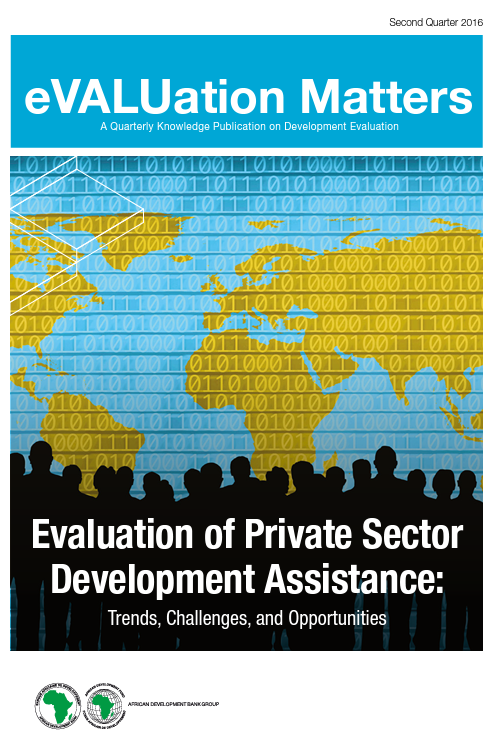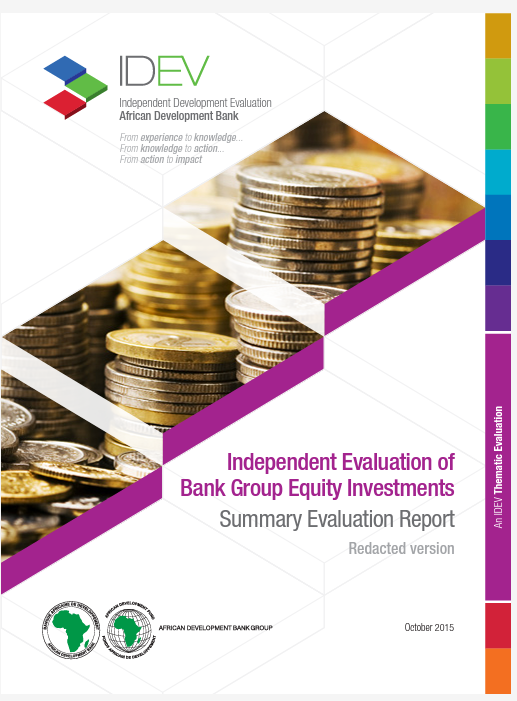The AfDB Annual Meetings in 2023 provided a framework for the Bank Group to share experiences with galvanizing private financing domestically and internationally and harnessing natural capital to bridge the climate financing gap and promote the transition to green growth in Africa. What are Africa's challenges in attracting private sector financing in low-carbon investments and what practical policies can governments deploy to address these bottlenecks?
Learning from past experience is critical. IDEV is contributing to the discussion on private sector financing with relevant and actionable knowledge gained from evaluations. To gain insight into IDEV’s work on private sector-led development in Africa, see the related resources.
Evaluation of the AfDB’s Implementation of its Non-Sovereign Operations (2014-2020)IDEV conducted an evaluation of the Bank’s implementation of its Non-Sovereign Operations (NSOs) over the period 2014-2020. NSOs are operations that the Bank supports through its private sector lending window. Over this period, the Bank approved a total of 194 non-sovereign transactions valued at USD 11.192 billion. |
|
Evaluation of the AfDB’s Private Sector Development strategy (2013-2019)IDEV conducted an evaluation of the Bank’s 2013-2019 Private Sector Development Strategy to take stock of its implementation and assess its contribution to the Bank’s efficiency and effectiveness, and with a view of informing the new PSD Strategy. Seven country case studies were part of the evaluation. The evaluation noted that implementation of the 2013-2019 Private Sector Development Strategy worked well during the early years but momentum subsequently stalled. The Results Measurement Framework was not used to monitor progress and the planned mid-term review was not undertaken. |
|
|
|
Evaluation of Loan Syndication at the AfDB, 2008-2019As part of the evaluation of partnerships at the Bank, this evaluation assessed the Bank's performance in mobilizing resources from the private sector through loan syndication. Its findings give an overview of the performance over the past decade, while highlighting recent improvements and persisting challenges. They are presented under the three criteria of relevance, effectiveness, and efficiency. |
Synthesis Report on the Validation of 2014-2019 Expanded Supervision ReportsThe main lessons and success drivers from the 2014-2019 Expanded Supervision Reports by the Bank are related to factors that appear to have a direct, causal effect on the intervention's success and its realization of its intended development outcome. They are suitable and valuable to the NSO portfolio as a whole. The evaluation noted that working with good sponsors is the most deterministic factor in overall project success. Good front-end work is instrumental to the assessment and achievement of targeted development results, and non-lending assistance is correlated with higher rates of project success. |
|
Evaluation of the AfDB’s Role in Increasing Access to Finance in Africa - Project Cluster EvaluationIncreasing access to finance is one of the three objectives of the Bank’s Financial Sector Development Policy and Strategy (FSDPS) for 2014 – 2019. IDEV undertook a thematic evaluation of the Bank’s role in increasing access to finance in Africa. The thematic evaluation is supported by a cluster evaluation of 32 Bank financial sector development (FSD) operations extended to financial institutions and governments in seven countries selected from the five African regions. |
|
Evaluation of the Bank’s Role in Increasing Access to Finance in Africa - Thematic EvaluationIncreasing access to finance while paying particular attention to reaching the traditionally underserved was one of the three objectives of the Bank's Financial Sector Development Policy and Strategy, while the two others were to deepen financial markets and to safeguard the stability of Africa’s financial system. To provide credible information on the role of the Bank in increased access to finance and financial inclusion in Africa, and to inform the development of the Bank’s next Financial Sector Development Strategy, IDEV conducted a thematic evaluation to assess the relevance and the quality of the Financial Sector Development Policy and Strategy. |
|
Evaluation of the Bank’s utilization of the Public Private Partnership Mechanism, 2006 - 2017Given the emphasis placed on Public-Private Partnerships (PPPs) as a means of closing the continent’s infrastructure gap and promoting social and economic development, IDEV conducted an evaluation of the Bank’s utilization of its Public-Private Partnership mechanism over the period 2006-2017. The objectives of the evaluation were to assess the extent to which the Bank’s PPP interventions achieved development results; |
|
Evaluation of the Ex-Ante Additionality and Development Outcome Assessment Framework 2.0IDEV) undertook an evaluation of the Bank’s second Additionality and Development Outcomes Assessment (ADOA) Framework, approved in 2015. The ADOA Framework is a decision-making tool to improve project design and selectivity of the Bank’s Non-Sovereign Operations (NSO) - investment operations that are not guaranteed by any state and are provided on market terms. It assesses two dimensions of NSOs, namely i) additionality, which measures the contribution from the Bank’s private sector interventions that markets do not currently supply, and ii) development outcomes. The Bank is in the process of revising the ADOA 2.0 Framework, as part of the commitments it made in its 7th General Capital Increase. The evaluation provides evidence of what has worked and what could improve this revision. |
|
 |
IDEV Presentation: Highlights and insights from the recent evaluations related to private sector-led development: Learning from resultsA presentation focusing on lessons for improving PSD intervention design, implementation & results at high-level & project-level. Evaluators discuss upstream and downstream support; non-lending & lending instruments; and how well the Bank designed and managed PSD interventions. |
|
|
IDEV Presentation: How can the Bank help create an enabling environment for Private Sector Development in Regional Member Countries?A presentation focusing on how the Bank can help create an enabling environment for Private Sector Development in African countries. IDEV evaluators explore how Program Based Operations can constitute a powerful tool to help create an enabling environment for Private Sector Development. |
Evaluation Of The African Development Bank Group’s Program Based Operations: Private Sector Enabling Environment ClusterThe IDEV Private Sector Environment Cluster Evaluation assessed the relevance, effectiveness, efficiency and sustainability of the Programme Based Operations of the AfDB that focused on the Private Sector Environment. The AfDB conducted these Programme Based Operations in five countries (Egypt, Ghana, Mali, Morocco and Seychelles) between 2012 and 2017. This report synthesizes the key findings of the evaluation and draws relevant lessons for the future design and management of Programme Based Operations by the AfDB. |
|
Do Lines of Credit attain their Development Objectives? An Evaluation Synthesis 2010-2017IDEV conducted an evaluation synthesis of Lines of Credit (LOCs) in response to a request of the Board for an independent review of the effectiveness of the Bank’s LOCs. The objectives of the synthesis were to identify good practices from the experience of the AfDB and peer institutions on the achievement of LOCs development objectives, and also draw lessons that could inform design, implementation and use of future LOCs. |
|
Towards Private Sector Led Growth: Lessons of ExperienceThis synthesis outlines the key findings of 33 evaluations of support for private sector development (PSD) undertaken by bilateral and multilateral institutions over the past five years. The purpose of the synthesis is to inform the strategic direction, design, and implementation of future PSD initiatives so as to leverage the sector’s role in spurring economic growth and advancing development effectiveness in Africa. |
|
SME: Evaluation of Bank Assistance 2006-2013This IDEV evaluation reviews the assistance provided by the African Development Bank to small and medium enterprises (SMEs) from 2006 to 2013. The evaluation assessed the relevance, additionality, effectiveness, sustainability, and efficiency of SME assistance operations, as well as the Bank’s approach to SME development. The exercise involved a combination of desk work, including review of all relevant documents from various sources, and field work, including missions to six countries (Ghana, Kenya, Morocco, Tanzania, Togo, and Zambia). The evaluation also benchmarked the Bank’s operations, organizational setting, and procedures against two other multilateral development banks (MDBs), namely, the World Bank Group and the European Bank for Reconstruction and Development. |
|
Enabling Private Sector Development for Sustainable Industrialization |
|
AfDB and Norad shed light on private sector development actions |
|
Towards Private Sector-Led Growth - Knowledge-sharing and peer-learning eventDrawing on lessons learnt from an earlier presentation in Oslo, IDEV and Norad’s Evaluation Department (NoradDev) co-organized this dialogue forum in Kenya to share evaluative knowledge to enhance the relevance, effectiveness, and impact of future private sector development activities. See the event proceedings on this page. |
|
Private-sector stakeholders meet in Kenya for networking, peer-learning, and experience sharingThe Independent Evaluation Department of the African Development Bank (IDEV), and the Evaluation Department of the Norwegian Agency for Development Cooperation (Norad-Dev) in collaboration with the Regional Directorate - Eastern Africa, AfDB organized a two-day dialogue forum on the 3-4th of April 2017 in Nairobi, Kenya. Billed as a knowledge-sharing and peer-learning event, the forum attracted over 60 participants from the Kenyan public and private sectors, bilateral and multilateral development agencies, development practitioners, AfDB management and staff, and others stakeholders engaged in private sector development. |
|
Financing Private Sector Development- What works, what does not and why?As part of a series of learning and knowledge sharing events on support for Private Sector Development, IDEV, together with Norad’s Evaluation Department, co-organized a learning event in Pretoria, South Africa, 30 - 31 October 2017. Specific objectives were to share evaluation results in a bid to contribute to learning and a rethink of PSD support and how it can be made more effective; and provide insights that inform policy/decision makers and development partners, while offering clear and evidence-based conclusions and recommendations in terms of a) policy directions enabling African countries to strategically and beneficially partner with private sector actors and development partners; and b) capacity development imperatives. The news report of the event is available here. |
|
Evaluation Matters Second Quarter 2016 - Evaluation of Private Sector Development AssistanceA robust private sector is widely recognized by the international development community as an engine of sustainable and inclusive economic growth. Donor support for private sector development varies: While some donor institutions focus on the enabling environment for private sector growth, others focus on providing direct and indirect financing to private enterprises. Each approach has its own benefits, weaknesses, and risks. What does development evaluation tell us about the different approaches and their outcomes? What works, what does not work and why? More importantly, what are the challenges in evaluating private sector development assistance and what can we do about them? What are the good practices that can be emulated? |
|
Independent Evaluation of Bank Group Equity InvestmentsIDEV conducted an evaluation of the Bank Group’s Equity investments, examining the 291 realized and unrealized investee companies across 24 fund managers and 31 distinct funds. Equity investments were assessed in terms of their alignment with the Bank’s key sectors, regional diversification, regional integration, support of micro and small-sized enterprises, and fragile states. The objective of the evaluation was to assess the relevance and performance of the Bank’s equity investments; and identify lessons to inform the Bank’s decisions on the future use of equity investments. |
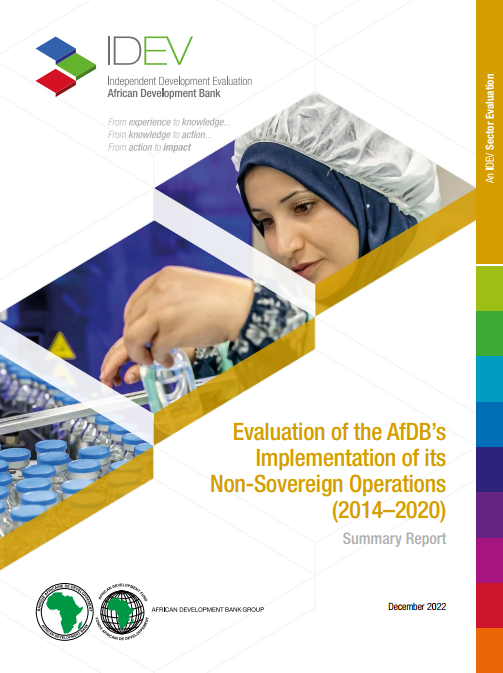
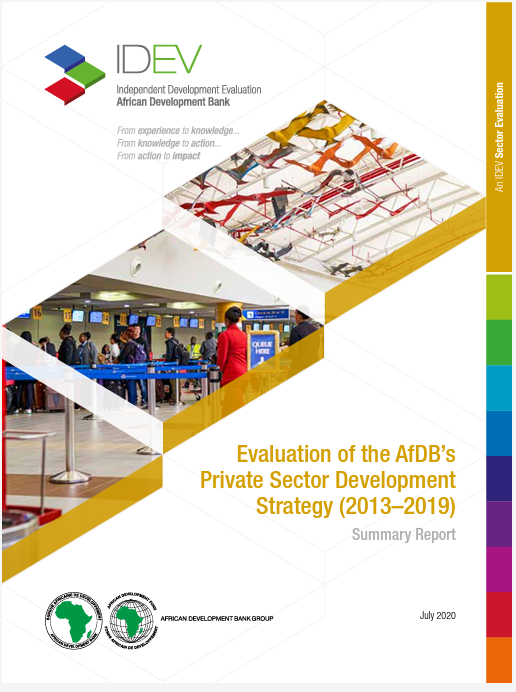

.png)
